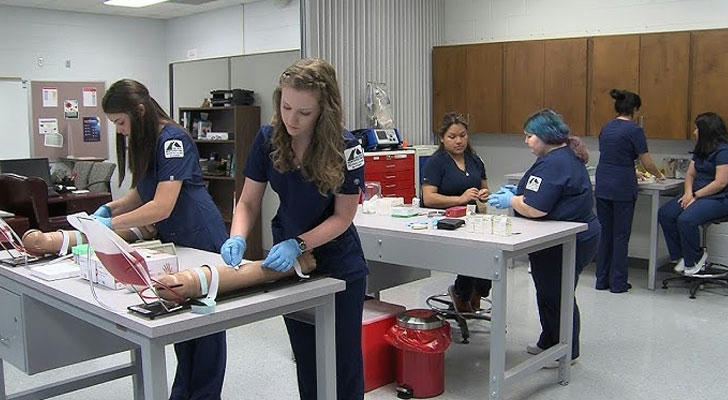Step into the Heart of Healthcare: The Ultimate Guide to Becoming a Medical Assistant (MA)
A Medical Assistant (MA) is a multi-skilled healthcare professional who provides both clinical and administrative support in a variety of medical settings. These professionals work directly with patients, assisting physicians and nurses with medical procedures, taking patient histories, measuring vital signs, and performing diagnostic tests. Medical Assistants also handle essential office tasks, such as scheduling appointments, managing patient records, and processing insurance claims.

What is a Medical Assistant?
Medical Assistants are crucial members of healthcare teams, working in settings like doctor's offices, outpatient clinics, hospitals, and specialty practices. Their ability to juggle both clinical and administrative duties allows healthcare professionals to focus more on patient care, making them indispensable in the modern medical environment.
How to Become a Medical Assistant?
The path to becoming a Medical Assistant is relatively short and straightforward, making it an attractive career choice for those looking to enter the healthcare field quickly. Here's what you need to do:
- Complete a Medical Assistant Training Program
Training programs for Medical Assistants typically take 9 to 12 months to complete. These programs are offered at community colleges, vocational schools, and online platforms. During the training, students learn both clinical and administrative skills, including:
Taking vital signs and performing physical exams
Drawing blood and performing lab tests
Scheduling appointments and managing medical records
Understanding medical terminology and billing codes
- Get Certified (Optional, but Highly Recommended)
While certification isn’t always required, many employers prefer candidates who are Certified Medical Assistants (CMA). Certification can be earned by passing an exam administered by organizations like the American Association of Medical Assistants (AAMA) or American Medical Technologists (AMT). Certification demonstrates a high level of competency and can increase job opportunities and salary potential.
- Find Employment
Medical Assistants can find work in various healthcare settings, including physician’s offices, hospitals, outpatient clinics, and even in specialized fields such as pediatrics, cardiology, or dermatology.

Career Prospects and Job Outlook
The job outlook for Medical Assistants is excellent. According to the U.S. Bureau of Labor Statistics (BLS), the employment of Medical Assistants is expected to grow by 16% from 2021 to 2031, which is much faster than the average for other occupations. As the healthcare industry expands, there will be an increasing demand for healthcare services, driving the need for Medical Assistants in various healthcare settings.
Additionally, Medical Assistants often have opportunities to specialize in certain areas of medicine, such as pediatric, ophthalmology, or orthopedic practices. Specializing can lead to higher pay and more job security.
Real-Life Case Studies
- Case Study: Jessica – Becoming a CMA and Advancing in the Field
Jessica started her career as a Medical Assistant after completing a one-year training program at a local community college. She initially worked as a general Medical Assistant in a family practice, where she gained experience with a wide variety of patients. After a couple of years, Jessica chose to pursue certification through the American Association of Medical Assistants (AAMA), becoming a Certified Medical Assistant (CMA). This certification helped her secure a higher-paying position in a pediatric clinic. "Becoming certified was a game-changer for my career," Jessica says. "It opened up more opportunities, including the chance to work with children, which is what I love."
- Case Study: Carlos – From MA to Office Manager
Carlos began his career as a Medical Assistant working in a busy internal medicine practice. He enjoyed interacting with patients and learning about medical procedures, but over time, he developed an interest in the administrative side of the job. After several years of hands-on experience, Carlos earned a promotion to Medical Office Manager. In this new role, he oversees the scheduling, billing, and staffing for the office while still maintaining his MA duties when necessary. "My job has evolved a lot over the years," Carlos explains. "As a Medical Assistant, I was able to learn both the clinical and administrative sides, and that made transitioning into office management much easier."
- Case Study: Samantha – Transitioning to a Specialty Practice
Samantha has worked as a Medical Assistant for nearly a decade, starting in a family practice and eventually transitioning into a dermatology practice. By gaining experience with dermatology-specific procedures, such as taking skin biopsies and assisting in dermatological surgeries, Samantha found a new passion for skin care. "Working in a specialty practice like dermatology has been so fulfilling," Samantha shares. "I get to focus on a specific area of medicine, and I’ve developed a deep understanding of dermatological conditions. Plus, the salary potential in specialty fields is generally higher."

Why Choose a Career as a Medical Assistant?
There are several reasons why becoming a Medical Assistant is a great career choice:
Fast Track to Employment: Medical Assistant training programs are short, typically lasting between 9 and 12 months, meaning you can start working in healthcare quickly.
Job Stability: As the demand for healthcare services increases, Medical Assistants are needed more than ever. The BLS predicts strong job growth in this field.
Career Flexibility: Medical Assistants have the flexibility to work in a wide variety of healthcare settings and can even specialize in areas such as pediatrics, cardiology, or orthopedics.
Opportunities for Advancement: With experience and additional certifications, Medical Assistants can move into roles such as medical office manager, clinical coordinator, or even pursue further education to become a nurse or physician assistant.
Conclusion
Becoming a Medical Assistant is an excellent way to enter the healthcare field, offering a diverse range of tasks, a flexible work environment, and opportunities for career advancement. Whether you choose to specialize in a specific field or continue your education to advance to a higher role, the path of a Medical Assistant can be both fulfilling and rewarding. With a growing demand for healthcare services and a strong job outlook, this career is an excellent choice for anyone looking to make a difference in patients' lives while enjoying a stable, rewarding job.
